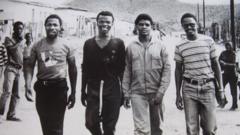The government aims to probe longstanding allegations of hindrance in prosecuting apartheid-era crimes, igniting hope among victims' families for overdue justice.
South Africa Launches Inquiry into Apartheid-Era Prosecutions

South Africa Launches Inquiry into Apartheid-Era Prosecutions
In a bid for justice, South African President Cyril Ramaphosa announces an inquiry into political interference in apartheid prosecutions, responding to survivors' calls for accountability.
In a significant move towards addressing the unresolved atrocities of apartheid, South African President Cyril Ramaphosa has declared a judicial inquiry aimed at investigating accusations of political interference that have hindered the prosecution of crimes committed during the apartheid era. This decision follows decades of frustration experienced by survivors and the families of victims who argue that the legal processes surrounding these serious allegations have been grossly inadequate.
The inquiry's formation comes as a direct result of a high court case initiated by a coalition of 25 families and survivors. This group is suing the South African government for $9 million (£6.8 million), alleging a failure to thoroughly investigate apartheid-era crimes in the democratized state that followed the end of white-minority rule nearly thirty years ago. Despite the establishment of the Truth and Reconciliation Commission (TRC) in 1996, which aimed to address atrocities such as murder and torture, relatively few cases were successfully brought to trial, leaving many feeling that justice had been evaded.
Ramaphosa, in a presidential statement, emphasized his commitment to uncovering the truth and ensuring that these matters are conclusively addressed. The inquiry is seen as a long-overdue step towards eradicating lingering uncertainties surrounding past injustices. Notably, the plaintiffs include the son of Fort Calata, a member of the Cradock Four, a group of activists brutally killed by state security forces in 1985. Although six former police officers confessed to their involvement, they were neither prosecuted nor held accountable before their deaths.
Critics of the African National Congress (ANC), which has led South Africa since the fall of apartheid, have long alleged that there was a clandestine accord with the former apartheid government to sidestep legal accountability. While the ANC has consistently disputed these claims, the presidency acknowledged ongoing allegations of improper influence affecting investigations and prosecutions stemming from past administrations.
The head of the inquiry and its operational timeline are expected to be released shortly, marking a pivotal moment in South Africa's ongoing struggle for justice and reconciliation in the wake of its turbulent past.
The inquiry's formation comes as a direct result of a high court case initiated by a coalition of 25 families and survivors. This group is suing the South African government for $9 million (£6.8 million), alleging a failure to thoroughly investigate apartheid-era crimes in the democratized state that followed the end of white-minority rule nearly thirty years ago. Despite the establishment of the Truth and Reconciliation Commission (TRC) in 1996, which aimed to address atrocities such as murder and torture, relatively few cases were successfully brought to trial, leaving many feeling that justice had been evaded.
Ramaphosa, in a presidential statement, emphasized his commitment to uncovering the truth and ensuring that these matters are conclusively addressed. The inquiry is seen as a long-overdue step towards eradicating lingering uncertainties surrounding past injustices. Notably, the plaintiffs include the son of Fort Calata, a member of the Cradock Four, a group of activists brutally killed by state security forces in 1985. Although six former police officers confessed to their involvement, they were neither prosecuted nor held accountable before their deaths.
Critics of the African National Congress (ANC), which has led South Africa since the fall of apartheid, have long alleged that there was a clandestine accord with the former apartheid government to sidestep legal accountability. While the ANC has consistently disputed these claims, the presidency acknowledged ongoing allegations of improper influence affecting investigations and prosecutions stemming from past administrations.
The head of the inquiry and its operational timeline are expected to be released shortly, marking a pivotal moment in South Africa's ongoing struggle for justice and reconciliation in the wake of its turbulent past.






















